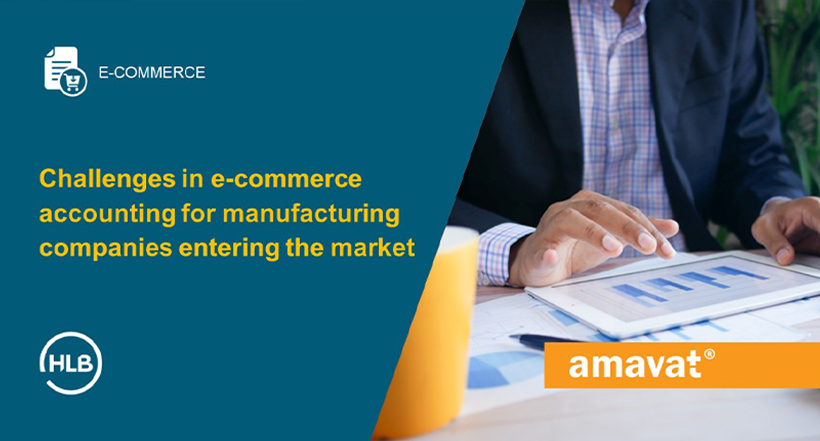Challenges in e-commerce accounting for manufacturing companies entering the market
E-commerce is a rapidly growing industry where an increasing number of entrepreneurs see opportunities for development and expansion. This also includes manufacturing companies, which are looking for new purchasers, either on their own or in cooperation with online shops. Often, these companies choose to base their product sales on the e-commerce market. While this strategy makes sense, it also poses numerous accounting challenges. What are the accounting aspects that manufacturing companies entering the e-commerce market must grapple with?
The high volume of transactions, automatically generated invoices, and payments processed through external platforms (e.g., Allegro, PayU, Przelewy 24) all demand a unique approach and tailored responses to the specific needs of e-commerce accounting. For a manufacturing company entering the e-commerce market to thrive in this sector, specialized knowledge in taxation, accounting, international export, and a profound understanding of the intricacies of e-commerce business are indispensable.
It is also important to have access to advanced tools and up-to-date knowledge of how sales platforms and payment systems work.
Here are the key challenges of e-commerce accounting that managers of manufacturing companies must keep in mind!
Comprehensive and specialized e-commerce accounting for manufacturing companies
Manufacturing companies have a different nature compared to service-oriented businesses, thus requiring specialized actions in the realm of e-commerce accounting and the synchronization of accounting-warehouse systems. Manufacturing entities need to tackle issues such as production cost calculation in relation to potential profits in the e-commerce market and excise duty. Therefore, it is crucial that e-commerce accounting for manufacturing firms is managed by a professional accounting firm well-versed in the principles of both the e-commerce market and the manufacturing industry.
Automation of accounting and warehouse management processes
Complex accounting and warehouse processes in manufacturing companies should be automated, saving valuable time and streamlining key areas by eliminating tedious and repetitive tasks. Utilizing ready-made ERP systems from accounting firms that can be integrated with the accounting and warehouse system of a manufacturing company operating in the e-commerce market is advisable. This will enhance the overall logistics of manufacturing companies and facilitate accounting processes.
Integration of various accounting and sales platforms and real-time data synchronization
An appropriate ERP system in e-commerce accounting for manufacturing companies also allows for the integration and real-time synchronization of data from various platforms. This includes internal Excel files, sales control systems, invoicing software, accounting and tax systems, logistics programs, and inventory management systems. System integration also ensures enhanced data security.
Analysis of production costs and product profitability
The analysis of production costs and product profitability is a crucial aspect of e-commerce accounting for manufacturing companies in the e-commerce market. It enables the identification of potential cost reductions in production while maximizing profits through the sale of appropriately profitable products.
Remote 24/7 access to the customer portal and full control over e-commerce accounting
Another challenge in e-commerce accounting for manufacturing companies in the e-commerce market is the ability to have remote 24/7 access to all financial and accounting information from anywhere in the world. Professional accounting firms offer dedicated customer portals, providing quick access to all necessary information and easy communication with assigned account managers. This allows for complete control over e-commerce accounting.
Optimization of warehouse and delivery processes
Optimizing warehouse and delivery processes is a crucial aspect of functioning for manufacturing companies in the e-commerce market. Adequate e-commerce accounting can help focus attention on warehouse operations that require improvement, such as delivery reception conditions, storage, warehousing and sorting of goods, inventory management, order picking and preparation, as well as product shipping. The efficiency of warehouse operations translates into the quality of sales and the overall business of a manufacturing company in the e-commerce market.
Transparent returns and complaints policy
Returns and complaints are inherent aspects of commerce, affecting manufacturing companies operating in the e-commerce market. A returns policy must, on one hand, facilitate proper customer service and encourage purchases, and on the other hand, be managed appropriately from an e-commerce accounting and tax-financial standpoint, to avoid unnecessary costs for manufacturing companies in the e-commerce industry. Effectively accounting for complaints, exchanging goods, or issuing refunds, along with the subsequent warehousing, inventory adjustments, and potential losses or discrepancies, are crucial elements in managing e-commerce accounting for manufacturing companies.
Complex tax settlements
E-commerce often transcends national borders, encompassing nearly the entire world, introducing a diversity of tax rates, especially Value Added Tax (VAT), including settlements within the e-commerce VAT package and the associated complexities. Regulations change dynamically and are highly diverse, necessitating extensive knowledge and experience in e-commerce accounting to avoid issues with settlements and tax authorities. A professional accounting firm specializing in e-commerce accounting enables the efficient management of tax settlements in various markets and countries, providing tax advisory services.
Managing a large volume of sales and accounting transactions
Manufacturing companies entering the e-commerce market often handle a multitude of sales and accounting transactions daily, with the numbers growing exponentially. Therefore, it is crucial to manage e-commerce accounting effectively through a professional entity utilizing advanced accounting software. This software, through automation and efficient management of such a high volume of transactions, enables the swift and effective handling of accounting for manufacturing companies in the e-commerce market.
Data analysis and production forecasting in e-commerce accounting
With advanced tools and data analysis, e-commerce accounting for manufacturing companies allows for a comprehensive examination of sales trends, the effectiveness of marketing strategies, customer behavior, identification of popular products, and those lingering in the warehouse, among other insights. All these aspects empower better planning for the operations of manufacturing companies in the e-commerce market, facilitating informed and strategic business decisions.
E-commerce accounting for manufacturing companies – benefit from our experience!

Managing e-commerce accounting for manufacturing companies presents significant challenges, making it advantageous to entrust this responsibility entirely to a professional accounting firm.
Outsourcing e-commerce accounting to experts brings numerous benefits for manufacturing firms engaging with online stores and e-commerce entities, as well as those directly operating in the e-commerce market.
Professional e-commerce accounting empowers manufacturing companies to tackle specific accounting challenges, allowing them to fully focus on business operations and further expansion in the e-commerce market. Recognizing these challenges and entrusting e-commerce accounting to seasoned professionals is a strategic decision. E-commerce accounting outsourcing also translates into time and cost savings.
Whether you are already operating a manufacturing business or entering the e-commerce market and seeking comprehensive e-commerce accounting, we invite you to connect with our experts: Contact – amavat®.
amavat® Team
We are an independent member of HLB. THE GLOBAL ADVISORY AND ACCOUNTING NETWORK.






